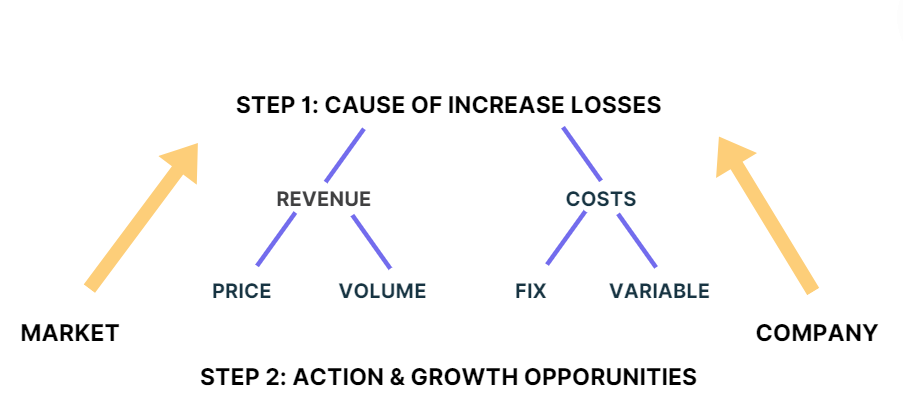Case interviews are one of the biggest challenges in the consulting recruitment process. Having a clear structure is the key to success. Organizing the information effectively is a really important step to mastering the interview. This is where good note-taking comes in! In this article, we will show you how to take notes during a case interview in a way that keeps you focused, organized, and ready to impress your interviewer.
Why Are Notes So Important in a Case Interview?
Notes in a case interview aren't just a personal tool—they're also a way to show the interviewer that you think in a structured and organized manner. A solid note-taking strategy can help you:
- Understand the case structure: When you can see all the information laid out, it's easier to spot patterns and connections.
- Stay on track: Especially in complex cases with lots of details, having structured notes helps you quickly reference key points.
- Back up your arguments: Well-organized notes allow you to support your conclusions with specific data, making your points more convincing.
Basic Principles for Effective Note-Taking
Preparation is key to effective note-taking during a case interview. Before the interview starts, make sure you have a clean, organized sheet of paper or a notebook ready. Keep multiple sheets available to avoid running out of space mid-interview. Consider pre-drawing a basic framework, such as a grid or sections for hypotheses, data, and questions, so you can immediately start organizing the information as it's given. Lastly, have a pen and backup writing tools within reach to ensure you aren’t scrambling for materials once the case begins.
An effective note-taking strategy relies on a few key principles. First, organize your notes into clear sections such as "Gathering Information," "Analysis," and "Conclusions" to maintain focus and facilitate quick reference. Write neatly and use a single side of the paper to keep everything visible and accessible.
Concentrate on the essentials by noting only key points, crucial facts, and important numbers. Avoid excessive detail, as this can overwhelm you. Begin your notes by summarizing the client’s situation and goals at the top of the first page, and leave space for additional notes as the interview progresses.
Use abbreviations and symbols to speed up your writing, and consider a landscape format for more space to include diagrams and visuals. Aim for simplicity and clarity in your notes, which will help you communicate effectively during the interview. Lastly, create a concluding sheet that summarizes your findings and recommendations for easy reference later.
The Three Phases of Note-Taking
In a case interview, organize your note-taking process by dividing it into three main phases:
1. Gathering Information
To effectively gather information during a case interview, it’s crucial to listen carefully as the interviewer introduces the case. Pay close attention to the key details, especially numbers and specific data points, as they will be essential later. If you notice any gaps in the information provided, don’t hesitate to ask targeted questions to fill those gaps, and make sure to record the answers clearly. Additionally, creating a separate, organized list of all the information you receive can help you stay on top of the details and quickly identify any missing pieces.
2. Structuring and Analyzing Information
Build a framework on a separate sheet to structure your analysis. Tools like decision or issue trees can break down complex problems into smaller, manageable parts, helping you analyze key issues and organize your thoughts. This approach also ensures clear communication during the case interview.

Visualizing your ideas not only aids in your analysis but also demonstrates to the interviewer your ability to organize information visually. Additionally, writing down different hypotheses and their potential outcomes makes your thought process more transparent and helps you explain it clearly during the interview.
3. Drawing Conclusions
Support your arguments by using your notes to back up conclusions with concrete data, which demonstrates confidence and strengthens your recommendations. Keep your notes well-organized so you can easily reference them if the interviewer asks about your process.
Practicing Your Note-Taking Skills
Like any skill, note-taking improves with practice. To hone your abilities, try doing mock case interviews or analyzing case studies on your own. Focus on writing down only the most critical information, using bullet points and abbreviations to capture ideas quickly. Time yourself to simulate the real pressure of an interview and review your notes afterward to see if they are clear and well-organized. Another useful technique is to record yourself talking through a case, then take notes based on the recording to practice capturing key points on the fly. Regular practice will make you more confident and efficient during actual interviews.
Conclusion: Mastering Your Note-Taking for Case Interview Success
Note-taking in a case interview is more than just a memory aid—it’s a key tool for solving the case in a structured and efficient way. When you learn to gather information effectively, organize it within a clear framework, and use it to build your arguments. Remember, your notes reflect your thinking style. So, practice your technique, develop your personal approach, and turn every note into a valuable tool for success in your next interview!
In our Case Library, you'll find numerous other relevant topics such as market analysis, market entry, restructuring, and much more. Why not take a look inside? 🚀
Do you have a question about note-taking skills that we haven't covered in the article yet? No problem! Just ask our experienced coaches in our Consulting Q&A.

